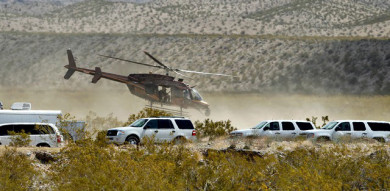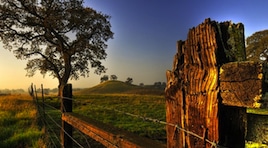 To say that the situation in Nevada between federal officials and cattle rancher Clive Bundy has gotten out of hand would be an understatement. As of this morning, armed federal officials have seized Mr. Bundy’s cattle, forcibly arrested his son, and surrounded his ranch with armed federal agents. The Bundy’s, for their part, have assembled hundreds of protesters on the property, and last night, Mr. Bundy alluded to a possible “range war” between his family and the Feds.
To say that the situation in Nevada between federal officials and cattle rancher Clive Bundy has gotten out of hand would be an understatement. As of this morning, armed federal officials have seized Mr. Bundy’s cattle, forcibly arrested his son, and surrounded his ranch with armed federal agents. The Bundy’s, for their part, have assembled hundreds of protesters on the property, and last night, Mr. Bundy alluded to a possible “range war” between his family and the Feds.
The stated reason for all this hullabaloo will depend on who’s telling the story, but the basic facts are as follows. The Bundy family has used the land to graze its cattle since 1877, long before Nevada was part of the United States. Several years ago the federal government changed grazing rules on public lands in order to protect the desert tortoise. Clive Bundy refused to comply with these new regulations, and continued to graze his cattle in the same manner as his family had for years. Shortly thereafter, the Federal government successfully secured a federal court order commanding Bundy to remove his cattle. Bundy refused. Recently, armed federal officials showed up and started confiscating Bundy’s cattle for trespassing on public lands, and as payment for unpaid fees. It has now become a national story.
On the one hand, the case seems pretty straightforward. Mr. Bundy is using federal land without permission. He has refused to pay his yearly grazing fees, and his cattle are violating federal law. It therefore makes sense that the government had to do something.
Yet, such oversimplifications don’t really apply here. In Nevada, the federal government lays claim to over 87 percent of all the land in the state. As the American Cattlemen’s Association president explained, this large degree of federal land ownership makes it impossible to maintain the cattle industry on private lands alone. Thus, it has long been the tradition in Nevada that ranchers may graze their cattle on federal land. Mr. Bundy’s family has used the particular piece of land in question here for that purpose since the 1870’s. Thus Mr. Bundy understandably felt that he had some right to continue that preexisting use. This feeling has only been fueled by allegations that the measures taken to protect the desert tortoise are overkill or unnecessary.
In the end, regardless whether Mr. Bundy has a legitimate legal claim to graze his cattle, the bigger take away from this case should be a wariness about government regulations. It is very easy not to notice, when one of the countless government agencies passes some new mandate about the desert tortoise or the delta smelt. These regulations may seem good hearted or insignificant. But at the end of the day, regulations have to be enforced. Enforcement can mean guns and violence. When that happens, good hard working people can lose their livelihoods, or even their lives. So the next time there is a debate about some seemingly good natured government mandate, remember Mr. Bundy’s case, and ask yourself if the desert tortoise (or whatever the case may be) is really worth it.
The Los Angeles and Sacramento land use lawyers at Kassouni Law practice with a focus on protecting clients’ Constitutional property rights. If you are experiencing a similar legal matter. Please consider calling Kassouni Law to have your case assessed by one of California’s most preeminent land use lawyer teams.

